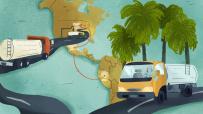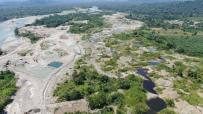
If she had fallen face down when they threw her into the creek, with her body badly beaten and her hands tied behind her back, Maribel Casancho would have suffocated and would not be here to tell what happened on Sunday, 17 May 2020. In a trembling voice, she says those were the hardest seven hours of her life. She and her husband, Gonzalo Pio Flores, were taken into the forest and tortured, before being shot. The indigenous leader bled to death and Maribel, seriously wounded, was tossed into a small creek nearby.
The death of Gonzalo, an activist dedicated to protecting the environment in central Peru, was not an isolated event. According to the National Human Rights Coordinating Committee, 12 environmental leaders have been killed in the country during the past seven years. Gonzalo had inherited this mission from his father, Mauro Pío Peña, who also was murdered while trying to help the Asháninka gain the title to their land in Nuevo Amanecer Hawai, a community located in the tri-border area between Junín-Pasco and Ucayali. It is one of the most biodiverse areas of the Peruvian Amazon rainforest and also one of the most ravaged. Defending the land, like his father, first earned Gonzalo threats from drug traffickers and loggers operating illegally in the area, and then death.
On the afternoon of the crime, Gonzalo and Maribel left their home in San Pascual and headed towards Alto San Pascual, which is half an hour away by foot. Both are communities in the Peruvian Amazon, an area that is home to 51 indigenous groups, among them the Asháninkas, the Awajún and the Shipibos.
It was hot, but that didn't stop them from going to look for workers to harvest coffee on their farm. When they arrived, Gonzalo and Maribel went to see some old friends. They were asking for suggestions about who to hire when they heard shots coming from home of the Ernesto Paredes family. It was not the first time they had encountered problems with them. Since 2017, the family had wrongly blamed Gonzalo for the death of one of their relatives. However, Rocio Meza, who is an attorney, says the alleged trouble seems like an excuse, and insists it was planned to hide the apparent link between the crime they were about to commit and Gonzalo's role in defending the environment.

DEFENDER. Gonzalo Pío led an effort to defend the land claimed by Nuevo Amanecer Hawai, an Asháninka community located on the border with Pasco, Ucayali and Junín, in central Peru. He was assassinated on May 17.
Credit: Gonzalo Pío’s personal file
At that point, the gunshots sounded closer and closer. Frightened, Maribel and Gonzalo ran to take refuge in Felipe Ernesto Anacina's house. He was someone they trusted, but he also is an uncle of the Ernesto Paredes siblings. When Maribel and Gonzalo reached Felipe’s house, they told him they had come to town to hire workers and not to look for trouble. He seemed to be listening to what they were saying; that is, until Bruss, Rosalinda, Erica and Sheryl Ernesto Paredes arrived with machetes and sticks.
They struck Gonzalo on the head with a stick, knocking him down, and threatened Maribel with a machete. Ernesto Anacina did not intervene. Several neighbors, including Francisco López, wanted to defend the couple, but their attackers threatened to kill anyone who might try to stop them. With what little strength they could muster, Maribel and Gonzalo managed to run towards a nearby grove of coffee trees, but they didn’t get far. Their assailants soon caught up with them. Then, while being told they would be killed like dogs, Gonzalo and Maribel were tied up, tortured and forced down a wide, dusty trail.
Maribel recalls they walked for half an hour with their hands tied behind their backs, being pushed and shoved along the way, until they reached an isolated spot. Speaking in Asháninka, the language of her people, she begged for their release, promising not to say anything to anyone or to report them to the police.
“Shut up or I’ll blow your husband’s head off,” shouted Bruss Ernesto Paredes, as he punched Gonzalo.
The Burden of a Legacy
The story of Gonzalo Pio Flores, who lived to be 45 years old, was marked by misfortune. In 2013, in the midst of a historic struggle to gain title to the land claimed by Nuevo Amanecer Hawai, his father – the founder of the town - was killed in a protest demonstration against illegal logging.
The dispute over their land had begun three decades earlier. In 1987, during an internal war against the Shining Path guerrillas, the inhabitants of the community (located between the regions of Junin, Pasco and Ucayali) were ousted by the terrorists. Mauro Pío and his family first took refuge in San Pascual and later in the town of Satipo. In San Pascual, he left behind a house and a farm that eventually was occupied over the years by his son, Gonzalo, who used the land to grow coffee.
The family was exiled there for thirteen years, until members of the Peruvian Army told them their community – known then as Piliari - had been pacified. This news prompted Mauro to encourage other indigenous members of the community to return home. When they did, three years later, they renamed the town Nuevo Amanecer Hawai (New Hawaiian Dawn) after the remains of a Hawaiian pineapple plantation found nearby. It is also a metaphor for a new beginning.
Gonzalo's father then became the local chief and held that position until he was killed. Seven years earlier, he had convinced the Pasco Regional Agricultural Authority to recognize his community and to begin the process to grant them title to their land.

MISSION. The community of Nuevo Amanecer Hawai is involved in a historic struggle to gain title to its land. In addition, its leaders must protect the community from drug traffickers and illegal logging and mining.
Credit: Gonzalo Pío’s personal file
At that time, the community also began to have problems with a group of businessmen who owned logging concessions. "Mauro was due to meet again with the Chairman of the Council of Ministers a week later to continue the titling process. But he was shot in the head on 27 May 2013. Those who were logging illegally wanted to prevent us from gaining title [to our land]," says Julio Tunque, a friend of the Apu and now a representative of the community.
The police identified the person who masterminded Mauro Pío’s assassination as Víctor Romero, who was the manager of a company known as Productos Forestales SRL. The two men who perpetrated the crime were identified as well, but the authorities released them all for lack of evidence. OjoPúblico was told by Rocio Meza, an attorney for the Legal Defense Institute (IDL), that "the case has gone unpunished."
When his father died, Gonzalo - Mauro’s third son - was elected as a member of the security and territorial defense committee for Nuevo Amanecer Hawai. In other words, he was entrusted with the mission his father had begun: to defend the land from trespassers, land traffickers, drug traffickers and illegal logging.
To help accomplish that goal, Gonzalo began to study elementary education in 2018 at a university in the town of Satipo. "He wanted to defend our rights, our territory, and to educate the youngest, the new generations," says his wife, who is 41 years old.
Waiting for Title to the Land
Nuevo Amanecer Hawai is located in the tri-border area along the junction of Junin-Pasco and Ucayali, in a region known as Gran Pajonal, which is home to rainforests that have attracted illegal logging and land traffickers. The Asháninka had already settled in the area when a well-known drug and timber trafficking route was established there, according to police reports. Eighty families live in an area comprised of 32,000 hectares of land that were recognized by the Regional Board of Agriculture in 2006. However, as Julio Tunque explains, 12 thousand of those hectares were invaded two years later by illegal loggers.
That was when the community’s problems began. The Organization for the Formalization of Land Ownership (COFOPRI) was relieved of its role as the land registry, and that responsibility was taken over by regional government authorities. Forestry companies arrived soon after and sparked conflict over land rights.
"The rules say forest concessions may not be granted in jurisdictions where indigenous communities coincide, and even less so where their borders have not been defined," explains Rocío Meza. In 2012, Mauro Pío met to discuss this problem with Óscar Valdés, who was chairman of the Council of Ministers during the administration of President Ollanta Humala (2011-2016).

WARRIORS. The Asháninka of Nuevo Amanecer dealt with Shining Path terrorists in the 1980s and 1990s. Since then, they have tried to protect their territory from outsiders.
Credit: Gonzalo Pío´s personal file.
At that meeting, an agreement was signed to grant title to several communities, one of which was Nuevo Amanecer Hawai. Although its leader was assassinated a year later, efforts to gain title to the land did not stop and Gonzalo continued the process, together with the community’s new leader, Jhover Melendez Flores.
By the time this article was written, the community had filed a protective suit to defend its rights as an indigenous group, with the support of the IDL. "It was filed after the death of Mauro Pío; however, two years later, the Constitutional Court had yet to rule on the case.” explains the lawyer.
The regional director of the Pasco Agricultural Authority, Ismael Cusi Ramon, told OjoPúblico that Nuevo Amanecer Hawai is included in a group of communities scheduled to be given title to their land through COFOPRI. The proceedings, however, have been suspended due to the pandemic. The new chief of the community says COVID-19 is an excuse to delay the titling process and favor more forest concessions.
Crime without Punishment
"Don't cry, Marita. What can we do? Let’s leave it in God’s hands,” Gonzalo told Maribel, his wife, just before he was shot in the back.
Maribel saw Gonzalo fall to the right and – wounded, but not fatally – she collapsed to the left. Dazed and on the ground, she saw Gonzalo was still breathing. But his abductors wasted no time finishing him off. And, seeing Maribel was still alive, they beat her with the butt of a shotgun until she was disfigured, strung her up, and then tossed her into the creek.
She lay there for about two hours, until she managed to regain strength and make her way back to her community to find help. The police report at the precinct in Satipo states that Rosa Márquez Maldonado, a neighbor, called police lieutenant Rosario Suazo Pariona in Santa Rosa de Cashingari, who was already taking part in a search for the couple. Hours earlier, one of Gonzalo's nieces had reported their disappearance to the police at the same station.
GAPS. Peru’s indigenous communities, like Nuevo Amanecer, have long been abandoned by the authorities. They suffer from a lack of health care, education and basic facilities for water and sanitation.
Credit: Gonzalo Pío´s personal file.
One witness told the police he saw the Asháninka couple being forcibly hauled off by Bruss, Rosalinda, Erica and Sheyrli Ernesto Paredes. While the police were removing Gonzalo Pío’s body, Prosecutor Jhon Barrón discovered signs that he had been hanged and shot. His left ear was cut off and his hands were tied behind his back.
The case is being investigated by Prosecutor Martha Baldeón Berrocal, but there has not been much progress. The Ernesto Paredes siblings are known to have attacked Pío while claiming he had murdered one of their relatives in 2017. However, the authorities are investigating whether the family is involved to some sort of illegal activity.
Maribel Casancho does not rule out the possibility that her husband was killed for defending his territory from drug traffickers and from loggers and miners who operate illegally in the area. "He received many threats from people linked to those activities," she says.
Rocio Meza, the lawyer who advises Maribel, agrees. She believes the motive for revenge does not fit the crime. Gonzalo and his father were defenders of their territory and regarded as an obstacle by those dedicated to illegal activities who wanted to set up operations in the forests of Junín. "They were surrounded by a very hostile atmosphere, because of their environmental struggle. So, the alleged revenge seems more like an excuse to divert attention from the real reason," she says.
On the last Thursday in August, the United Nations Special Rapporteurs on Human Rights, Extrajudicial Executions and the Rights of Indigenous Peoples reported they had yet to receive a reply from the Peruvian government regarding the murders of environmental leaders Gonzalo Pío Flores and Arbildo Meléndez, both from Huánuco. These crimes occurred during the pandemic. "We are concerned that environmental defenders are at greater risk because the attacks are focused on people working to gain title to their land," they said in a press release.
Meanwhile, Maribel fears for her life. She and her three children have taken refuge elsewhere. "I have received death threats and had to leave my community," she says, as she requests help while in the process of trying to find justice. She feels the case is at a standstill. She has asked the prosecutor for the file, but she refuses to show it to her because there is nothing new. "The defendants are on the run and have not testified. That's what she told me," says Maribel.
 Tienes reportajes guardados
Tienes reportajes guardados
















